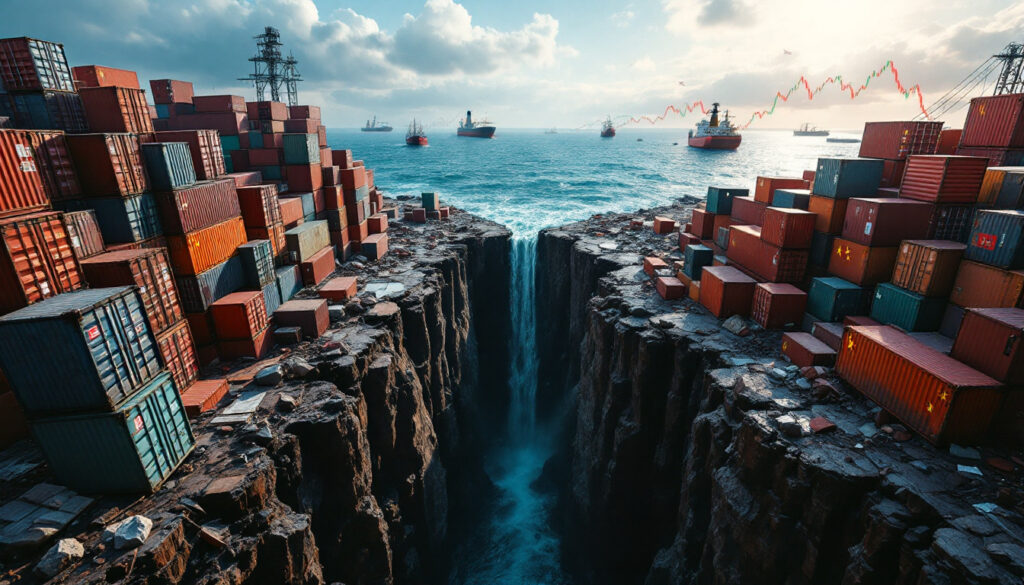Tariff and Trade War News: Global Economic Impact and Market Analysis
The recent escalation in US-China trade tensions has introduced significant volatility across global markets, with immediate repercussions in bond and equity markets. The Trump administration's imposition of new tariffs on 70 countries, coupled with retaliatory measures from China, underscores a strategic shift toward economic protectionism. Concurrently, geopolitical risks, including heightened military activity near Taiwan and Afghanistan, signal a reconfiguration of global alliances. Experts like Ray Dalio emphasize the structural economic shifts underlying these tensions, particularly the retreat from globalization and the challenges to the US dollar's reserve status. This report examines the multifaceted implications of these developments, drawing on quantitative data, expert analysis, and geopolitical shift strategies to provide a comprehensive assessment.
What Are the Latest Developments in US-China Trade Tensions?
Recent White House Tariff Announcements
The Trump administration's recent tariff policy, termed "liberation day" for American manufacturing, targets approximately 70 countries while exempting Canada and Mexico from restrictions on rare earth elements and critical minerals. This selective exemption highlights strategic prioritization of supply chain security for materials essential to technology and defense sectors. The administration has threatened additional 50% tariffs on Chinese goods, intensifying bilateral tensions. These measures align with a broader trend of economic decoupling, though critics argue the constitutional basis for such executive actions remains dubious.
China's retaliatory tariffs on US goods, including agricultural and industrial products, have further strained relations. The Chinese embassy has amplified its messaging campaigns in the US, framing the trade war as an affront to multilateralism. Notably, China's potential acceleration of US Treasury securities sales could destabilize debt markets, compounding existing fiscal challenges.
China's Immediate Response
Beijing's countermeasures extend beyond tariffs. Military movements around Taiwan have intensified, with reports of Chinese soldiers captured in Ukraine while supporting Russian forces. These actions suggest a coordinated strategy to exert pressure on US alliances. Additionally, China's critical mineral export restrictions threaten to disrupt global supply chains, particularly in sectors reliant on rare earth elements.
How Are Markets Reacting to the Trade War Escalation?
Bond Market Volatility
The bond market has experienced unprecedented turbulence, with long-term yields surging from sub-4% to 4.21% in a single trading session—a record single-day percentage increase. This volatility reflects investor anxiety over the US government's ability to finance its debt amid escalating deficits. Foreign holders of Treasury securities, including China, may accelerate divestment, exacerbating yield pressures. Understanding effective bond market strategies has become crucial for investors navigating this uncertainty.
Stock Market Impact
Equity markets have mirrored this volatility, particularly in resource and technology sectors. Mining stocks, sensitive to tariff exemptions on critical minerals, fluctuated sharply, while gold emerged as a safe-haven asset, rising 2.3% in the week following the announcements. Investors are recalibrating portfolios to account for supply chain restructuring, with a notable pivot toward regional manufacturing hubs in Mexico and Canada.
What Are the Long-Term Implications of the Current Trade Policies?
Ray Dalio's Economic Analysis
Ray Dalio warns that the trade war exemplifies broader structural shifts, including peak debt imbalances and the fragmentation of global economic blocs. His analysis emphasizes the "clinical" assessment of trade policies rather than ideological framing, noting that pre-existing trends of deglobalization have accelerated under current administrations.
"Look I'm not ideological about this, I'm looking at this as I would if I was a mechanic… let's look at the big picture, let's look at this clinically," Dalio stated in a recent CNBC interview, highlighting the importance of objective analysis amid partisan debates.
The retreat from dollar-centric trade, exemplified by BRICS nations' alternative frameworks, poses existential risks to US economic hegemony.
Shifting Global Economic Order
The emergence of regional economic blocs, particularly in the Indo-Pacific and Eastern Europe, signals a move toward hemisphere-based power structures. This realignment challenges the efficiency of global supply chains, with companies relocating production to mitigate tariff risks. The US dollar's reserve currency status, reliant on trade imbalances for liquidity, faces erosion as nations diversify reserves into euros, yuan, and gold.
How Does Government Spending Impact Trade Policy Effectiveness?
US Fiscal Challenges
Despite campaign promises to reduce spending, the Trump administration has approved the first $1 trillion military budget, redeploying forces to Afghanistan near strategic Chinese interests. The federal deficit is projected to exceed $2.1 trillion in 2024, undermining the credibility of proposed tax cuts. Treasury Secretary Scott Bessent confronts mounting challenges in debt management, particularly as yields rise and foreign buyers retreat.
Bond Market Vigilantes
Rising yields reflect market skepticism toward fiscal sustainability. The 10-year Treasury yield's 5% single-day spike underscores concerns over debt financing, with analysts predicting further hikes if tariffs and military spending persist. This environment complicates the administration's ability to leverage low-interest borrowing for infrastructure or tax reforms.
What Geopolitical Risks Are Emerging From Trade Tensions?
US-China Military Positioning
The US military's redeployment to Afghanistan, proximate to China's Belt and Road Initiative corridors, signals containment strategies reminiscent of Cold War-era tactics. Concurrently, Chinese naval exercises near Taiwan have escalated, with 43 incursions recorded in March 2025 alone. Analysts warn that economic chaos could pretext a Chinese move on Taiwan, leveraging instability to consolidate nationalist support.
Historical Context and Future Risks
The Nixon-era playbook of economic warfare, successful against the Soviet Union, faces limitations given China's integration into global markets. A Chinese economic collapse could trigger cascading failures in interdependent sectors, from semiconductor manufacturing to renewable energy. The risk of miscalculation is heightened by proxy conflicts, such as Chinese personnel involvement in Ukraine, which could spiral into direct confrontations.
Chris Temple of National Investor offers a valuable perspective: "The fact is that long before Donald Trump came on the scene even in Trump 1.0 back in 2017, there were trends afoot in this world where for various reasons and in various ways the global regimen of globalization and free trade was in retreat and was being unwound."
FAQ About Tariffs and Trade Wars
What is the constitutional basis for presidential tariff authority?
The constitutional authority for presidential tariff implementation has been described as "dubious" by some analysts, with questions about executive branch overreach in trade policy without congressional approval. The Commerce Department has justified these actions under Section 232 of the Trade Expansion Act, citing national security concerns, though legal challenges persist.
How do tariffs affect the US dollar's reserve currency status?
Reserve currency status requires other countries to run trade imbalances with the US to accumulate dollars. Aggressive tariff policies designed to eliminate trade deficits could potentially undermine the dollar's global position. As countries develop alternative payment systems, the percentage of global trade conducted in dollars has declined from 87% in 2000 to approximately 73% today.
What industries are most vulnerable to tariff escalation?
Manufacturing sectors with global supply chains, technology companies dependent on imported components, and agricultural exporters facing retaliatory tariffs typically face the greatest disruption during trade conflicts. Semiconductor manufacturers have reported 17% higher production costs due to tariff-related supply chain disruptions, while soybean farmers have seen export values decline by $10 billion annually since initial tariffs were implemented.
How might China respond beyond reciprocal tariffs?
China could accelerate selling of US Treasury securities, redirect critical mineral supplies to friendly nations, increase military pressure on Taiwan, and develop alternative payment systems to reduce dollar dependence. According to Reuters analysis, Beijing's options may be limited but focused on a strategy of attrition rather than immediate retaliation.
Expert Perspectives on Trade War Strategy
Temple further explains the complexity of analyzing tariff impacts: "The biggest problem that we have with all the intelligent economists, the politicians, everybody is that they're all coming at this whole tariff thing with one or the other form of TDS. They either have Trump derangement syndrome or they have Trump devotion syndrome."
How Trade Wars Impact Resource Markets
Critical Minerals Considerations
The specific exemptions for critical minerals from Canada and Mexico reveal the strategic importance of securing supply chains for materials essential to defense and technology sectors. These exemptions have created a 22% price premium for Canadian rare earth deposits compared to similar-grade deposits in non-exempt countries. Mining companies with operations in "friendly" jurisdictions have seen stock valuations increase by an average of 14% following the tariff announcements.
Strategic Resource Positioning
The reorientation of global supply chains has elevated the importance of domestic resource development. Countries with established mining regulations and environmental standards are increasingly attractive to investors seeking stability amid trade uncertainty. Beyond traditional precious metals, battery minerals and semiconductor materials have emerged as focal points in trade negotiations, with countries leveraging mineral wealth for diplomatic advantage. Recent global commodities insights suggest that political dynamics are increasingly driving investment opportunities in this sector.
The interplay of trade policies, market reactions, and geopolitical maneuvering underscores the fragility of the current global economic order. While the Trump administration's tariffs aim to revitalize domestic manufacturing, they risk accelerating the dollar's decline and fragmenting trade networks. Experts advocate for transparent communication and multilateral negotiation to mitigate systemic risks. Policymakers must balance protectionist measures with fiscal discipline, recognizing that long-term stability hinges on addressing structural debt and fostering cooperative frameworks. Meanwhile, investors are increasingly turning to gold market analysis for insights as the precious metal continues to serve as a safe haven during these uncertain times.
Want to Stay Ahead of Major Mining Discoveries?
Discovery Alert's proprietary Discovery IQ model delivers instant notifications on significant ASX mineral discoveries, transforming complex data into actionable investment insights before the broader market reacts. Explore why major mineral discoveries can lead to exceptional returns by visiting Discovery Alert's dedicated discoveries page and position yourself for the next market opportunity.




